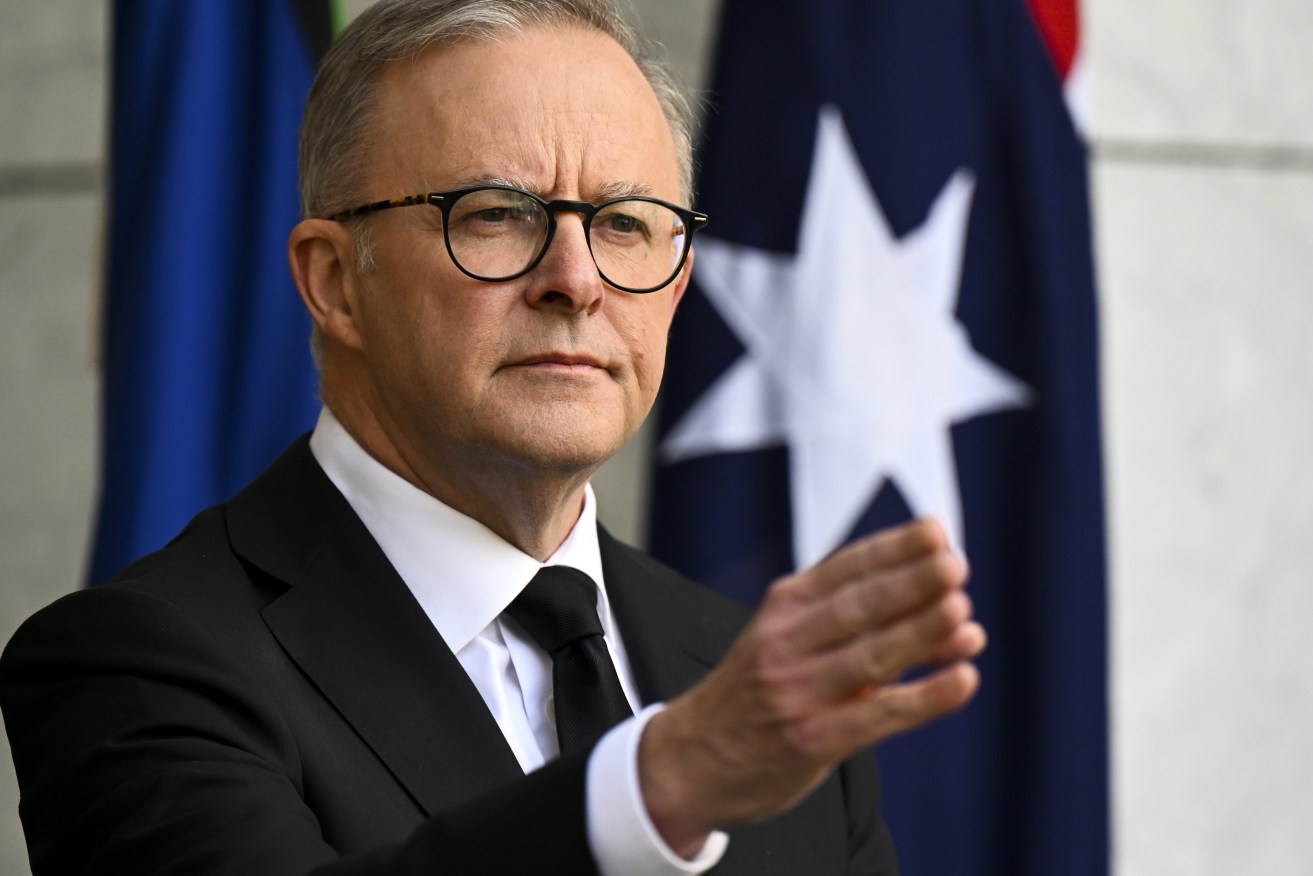Tell ’em they’re dreaming: Why Albo wants to challenge the basic rules of politics
Anthony Albanese’s government returns to Canberra with plans Sir Humphrey would call courageous. Dennis Atkins says they also challenge the basic rules of politics.


Australian Prime Minister Anthony Albanese speaks to the media. (AAP Image/Lukas Coch)
A stark irony of politics sees politicians as often the first people to forget the basic behavioral rules of their supposed calling.
Two debates sure to feature significantly in the two weeks of federal parliament beginning today go to the heart of one of these breakdowns in fundamental awareness.
Many senior Labor figures, topped by prime minister Anthony Albanese, argue that the referendum to change the Australian Constitution to include a Voice to Parliament for Aboriginal and Islander peoples is in no trouble at all and any suggestion otherwise is complete nonsense.
There’s also some daydreaming about engineering a double dissolution election to blunt the standing of the Greens Party and increase Labor’s numbers in the House and the Senate.
Both assumptions have a fragility seldom seen in national politics, especially occuring at the same time.
These assumptions set out to defy a bedrock rule of politics – one that’s prevailed in almost all contests since Aristotle wrote the first book on the subject 24 centuries ago. This simple truth holds that people vote against things. The adage that oppositions don’t win elections, governments lose them is based on this tenet.
Just look at Australian elections – governments have usually held on because the alternative was unacceptable, whether it was Bill Shorten last decade or John Hewson 30 years ago or Billy Snedden 10 years before that.
Even when it has turned out to be finely balanced – Bob Hawke just prevailing in 1990 or Julia Gillard and Malcolm Turnbull clinging on in more recent times – it was tipped one way or the other by a slightly greater antipathy to what else was on offer.
This was just as true in 2022 as it’s always been. The voters had worked Scott Morrison out – long before his colleagues did. They realised he was more than a bit weird, couldn’t be trusted and didn’t share everyday values. Labor’s Albanese, despite his own very obvious shortcomings, wasn’t seen as threatening as the incumbent and the ALP agenda didn’t frighten voters as Shorten’s tax and spend plans had three years before.
Now Albanese wants to test the iron law of politics on two fronts He wants to sell a change that has exposed deep doubts and misgivings and he is toying with having an early election.
The doubts and misgivings focus on the Voice to Parliament. It is a morally sound proposal – that the indigenous people be given Constitutional recognition and have a formal mechanism to be heard by the national government.
In a fundraising email last week the No campaign summed up their pitch this way: “Whether it’s abolishing Australia Day, taking land back, forcing taxpayer-funded compensation and reparations, or changing the rule book of the country to punish politicians, the activists have made it clear what their agenda is.”
In modern politics this is something that’s called a “feelpinion” or an opinion based on feelings not facts.
The Yes campaign’s answer is that none of this will happen. Anyone doubting the difficulty in that course should listen to Albanese’s bruising 35 minute encounter with Radio 2GB “shock jock” Ben Fordham almost two weeks ago.
Albanese might have thought he had the better of Fordham but a sample of people in the street in inner Brisbane in the last week suggest otherwise. Doubts appear to have solidified.
It is reminiscent of the doomed debate over the so-called rights and freedoms referendums in 1988 which included a question about guaranteeing freedom of religion in the Constitution. This seemingly simple question began with support of more than two to one and was defeated – along with every other question put – by a three to one vote.
The Liberal Party’s Peter Reith ran the No campaign and claimed enshrining freedom of religion would mean the end of Easter, leaving the proponents, the Hawke Government, to reply weakly that it wouldn’t.
The problem for the Yes campaign is they do not have strong support, despite what their spin machine says. A proposition that’s been slipping in support by three to four points every week or fortnight for most of the year – from the high 60s to barely 50 percent is in serious and obvious trouble.
To say a victory is going to be magicked up out of thin air is believing in fairy dust. Despite the fantasy brain of Scott Morrison, politics and miracles are not bed fellows.
The same hare-brained logic lies behind the early election, double dissolution election thinking that’s infected the upper echelons of the federal government.
A search of early Double-D polls since Bob Menzies had one in 1951 turns up a cautionary result. They almost always end in tears.
Even when governments prevail, it is by the skin of their electoral teeth and the often stated primary aim of improving numbers in the Senate is not realised.
The government would be giving the public something to vote against – an early election for no tangible reason beyond the political interests of those in power.
Voters do not like early elections – they’re usually not even keen on those held at the scheduled time. The ostensible reason for an early poll is to fight against the Greens Party’s opposition to the government’s affordable housing plans, something that would be fine if it was all that was on offer and if the government had acted when the underwhelming Labor plan was first blocked in the Senate.
Now the government’s offer looks ineffective, especially after Treasurer Jim Chalmers announced a $20 billion surplus for the just finished financial year. It doesn’t meet the challenge of the Greens Party’s backing of renters and those on low incomes wanting to get into the housing market.
Labor has been playing catch up on housing policy for most of the year and the fact the Greens Party’s offering has little logic or policy rigor, they have outsmarted Labor, leaving the government scrambling to find relevance.
They won’t get there by playing politics with talk of an early election.
The public are very ready to vote against anything at the moment. Why would a government go out of its way to give them more targets for this disgruntled sentiment?












